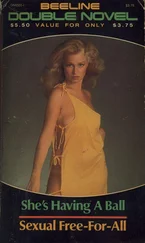Flash pushed his way through the crowd to greet Gene and Lou. He was wearing jodhpurs and riding boots, a gold-colored sport coat with brown leather vest, a white silk shirt, and an ascot.
“Some threads!” said Lou.
“New image,” Flash explained. “Gentleman sportsman.”
He went on to inform them that the N E A E A on the sashes of the punch servers stood for “New England Athletic and Entertainment Association.” That was the parent corporation which operated the North American Curling League. The N E A E A was sort of an umbrella, Flash said, under which he could move in many directions, both sports- and entertainment-wise.
“Don’t forget the Rolling Stones,” said Lou, intending a gentle warning.
“By no means,” Flash said. “They still have a following.”
He had to excuse himself to mingle with potential investors, but asked Gene and Lou to join him and some of his new associates for dinner.
Barnes bumbled into them, looking embarrassed. He was all spruced up, his eyes nervous.
“Where’s Nell?” Lou asked him.
“Fine,” said Barnes.
“I didn’t say how, I said where.”
“Home, I guess; I just thought I’d drop by for a sec.”
“Sure,” said Lou.
Barnes wasn’t asked to the dinner, Flash figuring rightly he was on the make and might take away from the influence he wanted to reserve for his first investor. That was Stan Plumley, a balding guy wearing a maroon double-knit with pink shirt and white tie. He sold auto insurance in Bangor, Maine, and Flash had sold him aluminum siding for his house last summer. More recently, Flash had sold him the North American Curling League franchise for his community. Flash had seated Plumley between Sissy and Sue, the two punch servers at the party.
Flash had taken them all to Bob Lee’s Islander, a Polynesian place in Chinatown that rewarded patrons with leis around the neck and served exotic drinks. When Plumley went to the men’s room, Gene asked if he had actually paid five grand for the Bangor, Maine, franchise in the North American Curling League.
“Certainly,” Flash said. “He is pledged to raise that amount. Thus far he has made an initial investment of a hundred and seventy-five dollars of his own cash moneys, as a show of good faith, and will proceed to collect the balance from among the leading businessmen of his community.”
“The other four thousand, eight hundred and twenty-five dollars,” said Lou.
Gene poked her under the table.
“We at N E A E A feel,” Flash said, “that funding of a franchise should be as widely distributed as possible, so as to insure broad-based community support.”
When Plumley returned from the men’s room, Flash proposed a toast to the new Bangor franchise.
“Let us raise our glasses,” he said, “to the Bangor—”
“What?” asked Plumley.
“Exactly,” said Flash, lowering his glass and looking thoughtful. “We have to think of a name. My own club is the Boston Brooms. That would have gone well with Bangor, too. Brooms. But that’s water over the dam. What would sound good with Bangor?”
“Battleships?” suggested Lou.
Gene poked her under the table again.
“The Bangor Battleships,” Flash said reflectively. He shook his head. “A bit cumbersome,” he said.
“Can it be a color of sox?” asked Sissy. “I mean like the Red Sox or White Sox?”
“How about the Bangor Blue Sox?” Lou said. “It’ll be so cold, even if they don’t have sox their legs will be blue.”
She poked Gene under the table before he could do it to her.
“We haven’t yet finalized the standard uniform,” Flash said, “so I don’t know if sox will be a prominent part of the gear.”
“Blazers,” said Plumley.
“I doubt the teams will wear blazers, Stan,” Flash said, “except perhaps for road trips. I like to see a club in matching slacks and blazers, carrying their equipment bags, as they debark from plane or bus.”
“Not wear em!” Plumley shouted. “Call em that!”
Flash looked momentarily puzzled but Sue clapped her hands and said, “Of course! The Bangor Blazers!”
“Oh, yeh, terrific,” Flash said.
Sissy and Sue each gave Stan a little kiss on the cheek. He grinned, high on rum and attention.
“To the Bangor Blazers!” Flash shouted, raising his glass.
They all drank.
Drunk, back home, Gene was giggling and shaking his head.
“Fuckin Flash,” he said. “Fuckin curling . Crazy. Lose all his bread again. Always gotta try some impossible goddam business.”
“Not so bad,” Lou said. “Better’n not ever tryin. Least he tries. Some people don’ even try.”
“You talkin about me?”
“Nobody. Talkin bout nothin.”
Through his drunken haze Gene knew it was best to shut up and go to bed.
Barnes’s big news brought everyone together.
An actual Hollywood movie producer with credits and credentials was going to make Barnes’s mystery a movie. Not the new one, The Crimson Corpse (they had changed the title), but good old Death of a Deb .
Fuckin Barnes. Wearing a pair of those gold prism glasses that you get in head shops. His eyes looked jumpy and small behind them, perverted pinballs. But below, his jaw was set in a solid grin, a jagged curved jack-o’-lantern.
“Rich!” said Nell, popping her pink bubble. “Tell em, man.”
Barnes said the deal was a hundred grand. Ten grand for a year’s option, ninety more if the movie got made.
Squeals, whistles, shouts.
Somehow everyone, Barnes included, thought of “his movie money” as the hundred grand he might get instead of the ten he was sure to get.
They all had their own idea about how he should spend it.
“A nightclub,” Gene said. “How about starting a nightclub? Barnes’s Blue Heaven, man. You could sit in a corner chain-smoking, doin a Bogart number.”
Thomas suggested a scientific approach to the dog tracks.
Nell was for a bank. Putting the money there.
Flash groaned.
“No vision,” he said. “None of you. Don’t you know your Prophets? ‘Where there is no vision, the people perish.’”
“Yeh,” said Barnes, “but look what happens when there’s too much.”
“If you are making snide reference to the North American Curling League,” Flash said, “it is still a viable entity with enormous growth potential.”
There were groans and hisses.
Nell started more brandy around, Thomas was a regular joint-rolling assembly line. It seemed like money, even the thought of it, got everyone high and then wanting to get higher. Maybe that’s how it was when you had your bull markets.
Lou said if she had the bread she’d buy land.
“Land,” said Barnes. “Yeh, I like it. I mean I like the idea of buying it, owning it. Something real. You can use it, walk around on it. Land . Sure. But what the hell would I do with it then? After I walked around on it?”
“Besides,” Nell said, “Barnes hates to walk. If it’s more than a block he takes a cab.”
“He could buy his own cab to have on the land,” said Thomas, “so he wouldn’t have to walk.”
“Really,” Barnes said. “What would I do with land?”
“Build a house on it,” Lou said. “Or buy some land with one on it already.”
“But I’d end up not really living in it,” Barnes said. “I’d say I would, and I’d mean to, but after a week or so I’d get bored and want to go back to the city. Some city or other. See. I really don’t think I could live anywhere.”
“None of us live anywhere,” Gene said. “Not really. Not like people used to do.”
“But Barnes wouldn’t have to be there all the time,” Lou said, “like living there permanent. When he got tired of living in the house he could loan it out to friends. There’s always people looking for a place to be for a while. Then later on Barnes could come back to it, maybe he’d want to stay there awhile with some other people there, too.”
Читать дальше












